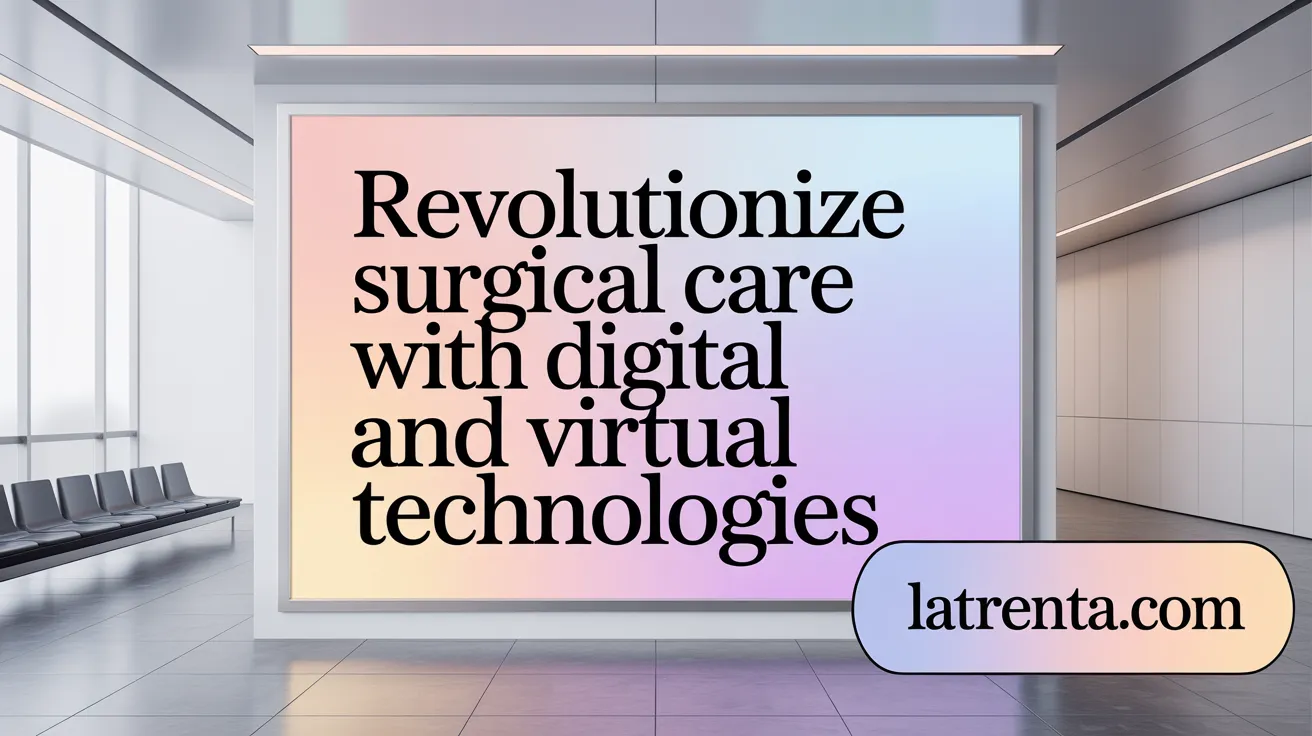Transforming the Surgical Journey with Personalized Care
In the rapidly evolving landscape of healthcare, concierge-level patient care is emerging as a transformative approach—especially within surgical environments. By blending personalized attention, advanced technology, and thorough care coordination, concierge models elevate patient experiences at every stage, from preoperative preparation to postoperative recovery. This article explores how concierge-level care enhances surgical journeys through innovative programs, patient-centered strategies, and seamless communication, setting new standards for quality and satisfaction.
The Concierge Model: Elevating Surgical and Medical Care Beyond Tradition

What distinguishes concierge medicine from traditional healthcare models?
Concierge medicine is a membership-based healthcare approach where patients pay an annual or monthly fee, often ranging from $1,500 to $10,000, to receive enhanced access to their physicians. This model contrasts sharply with traditional care by limiting the number of patients per doctor, allowing more personalized attention, longer appointment times, and 24/7 communication through phone, email, or text. In surgery, concierge medicine extends personalized care beyond consultation, focusing on thorough preoperative planning, individualized surgical strategies, and dedicated postoperative follow-ups. Learn more about Concierge medicine overview, Concierge Medicine at Massachusetts General Hospital, and Concierge Medicine program at UHealth.
How does concierge medicine improve patient outcomes and satisfaction?
Patients enrolled in concierge programs typically experience higher satisfaction rates and better engagement with their healthcare providers. The smaller patient panels enable doctors to spend more time addressing individual concerns, fostering trust and proactive preventive care. This personal attention leads to fewer hospitalizations and emergency visits, with better chronic condition management such as hypertension and diabetes. In surgical care, concierge models offer tailored preoperative preparation and enhanced post-discharge support, contributing to faster recoveries and holistic patient well-being. For more details, see Concierge medicine creates better patient outcomes and Concierge orthopedic surgery.
Advantages of concierge care in surgery and primary care
- Enhanced Access: Same-day or next-day appointments and direct communication with physicians (Concierge medicine overview, Concierge medicine vs. traditional primary care)
- Preventive Focus: Comprehensive health screenings, wellness programs, and personalized nutrition and fitness guidance (Inova 360° Concierge Medicine, Massachusetts General Hospital Concierge Medicine)
- Personalized Attention: Detailed understanding of medical history, lifestyle, and goals enable customized treatment plans (Concierge orthopaedics)
- Coordinated Care: Seamless referral to specialists and integrated follow-ups improve care continuity (Concierge medicine at Massachusetts General Hospital FAQ)
- Technological Integration: Use of telehealth, virtual consultations, and patient engagement tools for convenience and communication (Surgical Concierge pilot program)
Patient engagement and personalized attention
Concierge medicine prioritizes patient engagement through shared decision-making and two-way communication. Providers actively involve patients in treatment choices, respecting their preferences and cultural factors. Enhanced educational efforts before surgery reduce anxiety and set clear recovery expectations. Technologies facilitating virtual visits and automated guidance ensure patients receive continuous support and information throughout their care journey. Related research and approaches include Shared Decision-Making in Surgical Care, preoperative patient education benefits, and Patient engagement study to improve surgical experience.
Impact on patient satisfaction and healthcare outcomes
Research shows that concierge patients report higher satisfaction due to extended visits, better communication, and more proactive care strategies. This model results in reduced hospital admissions and improved management of chronic diseases. In surgical settings, patient-centered concierge care correlates with improved recovery times, lower readmission rates, and a more trusting patient-provider relationship. Such benefits contribute to the broader goals of healthcare efficiency, quality, and equity. For further information, see Patient-centered care in surgery, Concierge medicine benefits, and Toolkit for Improving Surgical Care and Recovery.
Integrating Technology and Virtual Care: The Surgical Concierge Initiative

What role do digital technologies play in concierge-level surgical care?
Digital tools are at the core of modern concierge-level surgical care models, streamlining the entire patient experience from initial referral to recovery. Platforms like secure video conferencing (Zoom) facilitate virtual doctor visits and telehealth consultations for surgery, providing patients timely access to their surgical teams without the need for in-person appointments. Additionally, digital communication tools such as Twistle automate patient guidance through text messaging, offering reminders, educational content, and recovery instructions directly to patients' mobile devices.
Use of digital tools in surgical concierge programs
Programs like Providence Digital Innovation Group’s Surgical Concierge pilot program leverage web-enabled consultation forms in surgical concierge programs to gather patient information efficiently and ensure that patients are connected to the appropriate surgical specialists. This integration reduces administrative barriers and keeps all care team members informed, which optimizes surgical planning.
Telehealth consultations and remote monitoring
Telehealth consultations for surgery not only improve preoperative preparation but also extend into post-operative care, allowing clinicians to remotely monitor recovery progress and quickly address patient concerns. This continuity of care reduces unnecessary hospital visits and can speed up recovery through timely interventions.
Coordinating care from referral to post-operative stages
The Surgical Concierge initiative coordinates the full spectrum of surgical care with a patient-centric focus, utilizing technology to provide seamless transitions between stages. Patients receive support with preparation steps, real-time tracking of their status, and communication cues that empower them through the surgical journey. This holistic approach enhances patient satisfaction and healthcare delivery efficiency, demonstrating how digital innovation transforms surgical care management.
Patient-Centered Care: The Heart of Concierge Surgical Experience

How does patient-centered care enhance the surgical experience?
Patient-centered care puts the patient at the core of the surgical journey, transforming the interaction from a one-sided process to a collaborative partnership. This approach respects patient preferences, provides transparent communication, and customizes care plans according to unique individual needs such as emotional and social factors. Patients become active participants in shaping their care, which boosts trust and engagement (Patient-centered care in surgery, Patient-centered surgical care, patient-centered care definition).
Shared decision-making and communication
Shared decision-making (SDM) is a cornerstone of patient-centered surgical care. It encourages surgeons and patients to explore treatment options together, considering evidence and the patient’s values. Using tools such as communication surveys and clear information aids ensures patients understand risks and expected outcomes. Enhanced communication builds confidence and helps patients feel informed and respected (Shared Decision-Making in Surgical Care, patient-centered surgical care).
Personalized preoperative education and expectation management
Personalized education before surgery reduces anxiety and prepares patients for what lies ahead. This includes tailored discussions, practical demonstrations, and addressing specific concerns about fasting, surgical scheduling, and post-discharge care. Educating patients on what to expect at home helps reduce confusion and readmissions, leading to a smoother recovery (preoperative patient education, patient engagement study, Toolkit for Improving Surgical Care and Recovery).
Importance of family involvement and empathy
Involving family members in the care process offers emotional support and aids in discharge planning and rehabilitation. Empathy from healthcare teams—demonstrated through respectful and compassionate interactions—alleviates patient fears and fosters a healing environment. Patients report higher satisfaction when they experience kindness and inclusion throughout their surgical experience (Patient-centered care in surgery, Patient-centered surgical care principles, patient-centered care definition.
Together, these elements create a comprehensive framework that not only improves health outcomes but also enhances the overall quality and comfort of surgical care within concierge medicine models, supporting better access, personalized experiences, and coordinated care.
The Concierge Approach in Orthopaedics: Personalized Surgical Planning and Recovery
What makes concierge orthopedic surgery unique?
Concierge orthopedic surgery stands out by focusing on highly personalized, patient-centric care. This approach involves a comprehensive understanding of each patient's medical history, lifestyle, and individual goals. Rather than a one-size-fits-all plan, the surgeon tailors treatment and recovery to the patient’s specific needs. Learn more about Concierge orthopedic surgery.
Features of concierge orthopedic surgery
- Personalized attention: Smaller patient panels allow for thorough preoperative assessments and meticulous planning. See details on Concierge orthopaedics.
- Minimally invasive techniques: These cutting-edge methods reduce postoperative pain and support faster healing. Explore Concierge orthopedic surgery.
- Comprehensive support: Continuous coordination from surgery through rehabilitation and follow-up visits ensures a smooth recovery journey. More on personalized orthopedic care.
Benefits over traditional orthopedic care models
Unlike traditional orthopedic care, which often features brief consultations and less personalized follow-up, concierge orthopedics offers:
- Longer, more meaningful patient interactions.
- Customized recovery plans that promote quicker return to daily activities.
- Dedicated team support providing peace of mind throughout the process.
This holistic care model enhances outcomes by minimizing complications and addressing patient concerns proactively. Ultimately, concierge orthopedic surgery redefines surgical care by blending advanced technology with personalized service, offering a more satisfying and effective experience for patients undergoing procedures like hip and knee replacements. For comprehensive insights, visit Concierge orthopedic surgery.
Addressing Patient Needs with Proactive Education and Communication
How does effective preoperative education improve surgical outcomes?
Effective preoperative education plays a crucial role in enhancing the surgical experience and outcomes by directly addressing patients' fears and questions. Many patients experience anxiety before surgery, often related to uncertainties about the procedure, fasting rules, and what to expect after discharge. Personalized education that incorporates two-way communication and practical demonstrations helps to reduce this anxiety significantly, boosting patient satisfaction and trust.
Providing tailored information ensures that patients better understand their surgical schedules and necessary preparations, such as fasting requirements. This understanding supports compliance and helps prevent last-minute cancellations or complications, leading to smoother procedures and recoveries.
Tools like videos, worksheets, and mobile apps for patient guidance
To further support patients, a range of digital and educational tools is employed. Interactive videos and discharge process worksheets offer clear, step-by-step explanations of what patients should expect during their hospital stay and once they return home. Moreover, mobile apps such as the 'Home to Stay' program provide automated guidance and monitoring through text messages, helping patients navigate post-discharge care confidently.
These tools facilitate continuous communication, remind patients about medication schedules, and alert healthcare providers if complications arise, ultimately aiming to reduce hospital readmissions and improve long-term recovery.
Improving discharge processes and home care expectations
Workshops involving surgeons and patients have identified improvements needed in discharge processes and setting realistic recovery expectations at home. By involving patients in shared decision-making and providing clear guidelines on managing pain, physical activity, and wound care, healthcare teams can better support patients after surgery.
A smooth discharge process includes thorough instructions delivered in various formats to accommodate different learning styles and allows for family involvement to ensure adequate support is available. This comprehensive approach ensures that patients feel prepared and empowered to manage their recovery effectively.
Ethical and Practical Considerations of Concierge Medicine in Surgery
What are the ethical and economic challenges of concierge medicine?
Concierge medicine requires patients to pay substantial annual fees, typically ranging from $1,500 to as high as $10,000. This financial requirement can limit access for lower-income individuals, raising concerns about creating a two-tier healthcare system in concierge medicine where affluent patients receive more personalized and timely surgical care.
How do costs affect access disparities?
High retainer fees present economic barriers, potentially excluding underserved populations from the benefits of concierge models. While concierge care can improve outcomes through personalized attention and preventive strategies, these advantages may widen gaps in healthcare access and equity.
Balancing personalized care with healthcare equity
The model excels in offering individualized attention and longer appointments, which improves patient satisfaction and engagement. However, this personalized care must be balanced against the ethical imperative to provide equitable access across socioeconomic groups to avoid systemic disparities, as discussed in Concierge medicine overview.
What are the legal and regulatory challenges?
Concierge medicine practices must comply with state insurance laws and billing regulations. There are ongoing concerns about regulatory adherence and ensuring transparent financial arrangements. Despite these challenges, concierge services remain lawful and increasingly integrated within respected academic medical centers and concierge care.
Sustainability and future outlook
Concierge medicine is expanding, driven by patient demand for enhanced access and care coordination. Its growth suggests sustainability if issues around affordability and equitable access are addressed. Integration with digital tools and broader healthcare systems may help balance personalized care with inclusivity and regulatory compliance, supported by resources on healthcare delivery efficiency and technology in concierge healthcare.
The Future of Surgical Care: Personalized, Connected, and Patient-Focused
Concierge-level patient care represents a paradigm shift in surgical practice, focusing on personalization, advanced technologies, and holistic support throughout the surgical journey. By fostering deep patient engagement, enhancing communication, and leveraging virtual tools, concierge models not only improve clinical outcomes but also transform the overall patient experience into one of trust, comfort, and collaboration. Balancing these benefits with ethical considerations and striving for broader accessibility will be essential as concierge care continues to evolve. Ultimately, this approach holds great promise to redefine surgical care delivery, offering patients a truly elevated and compassionate healing experience.
